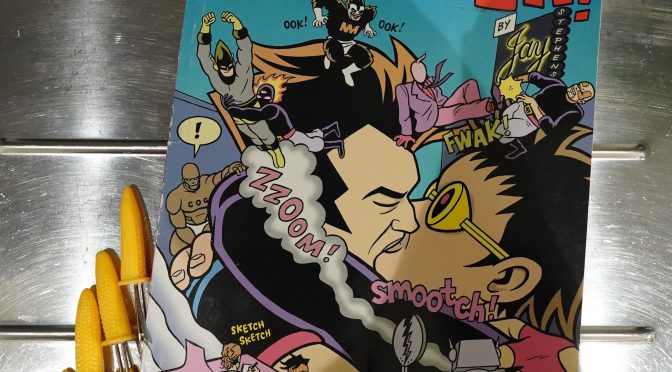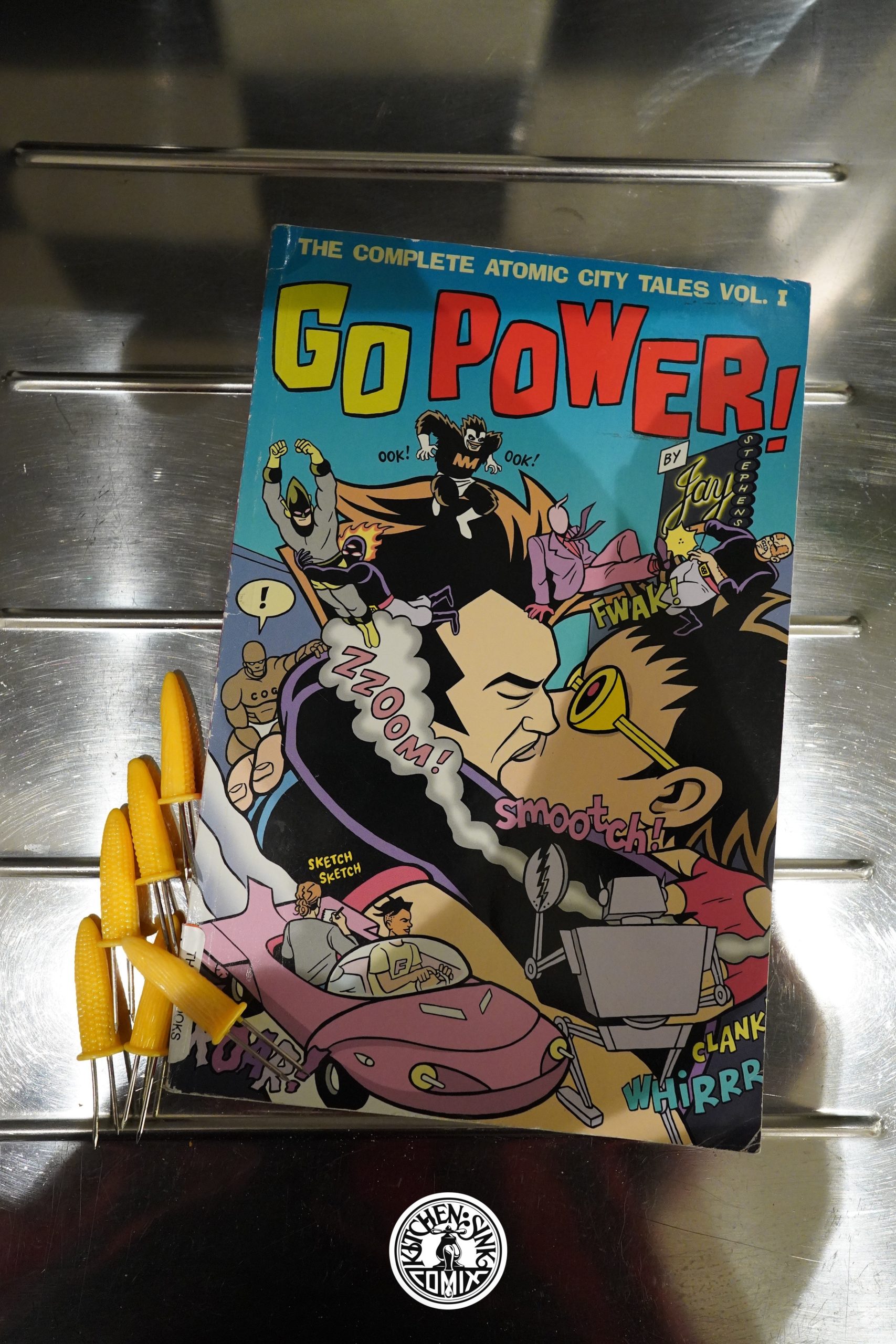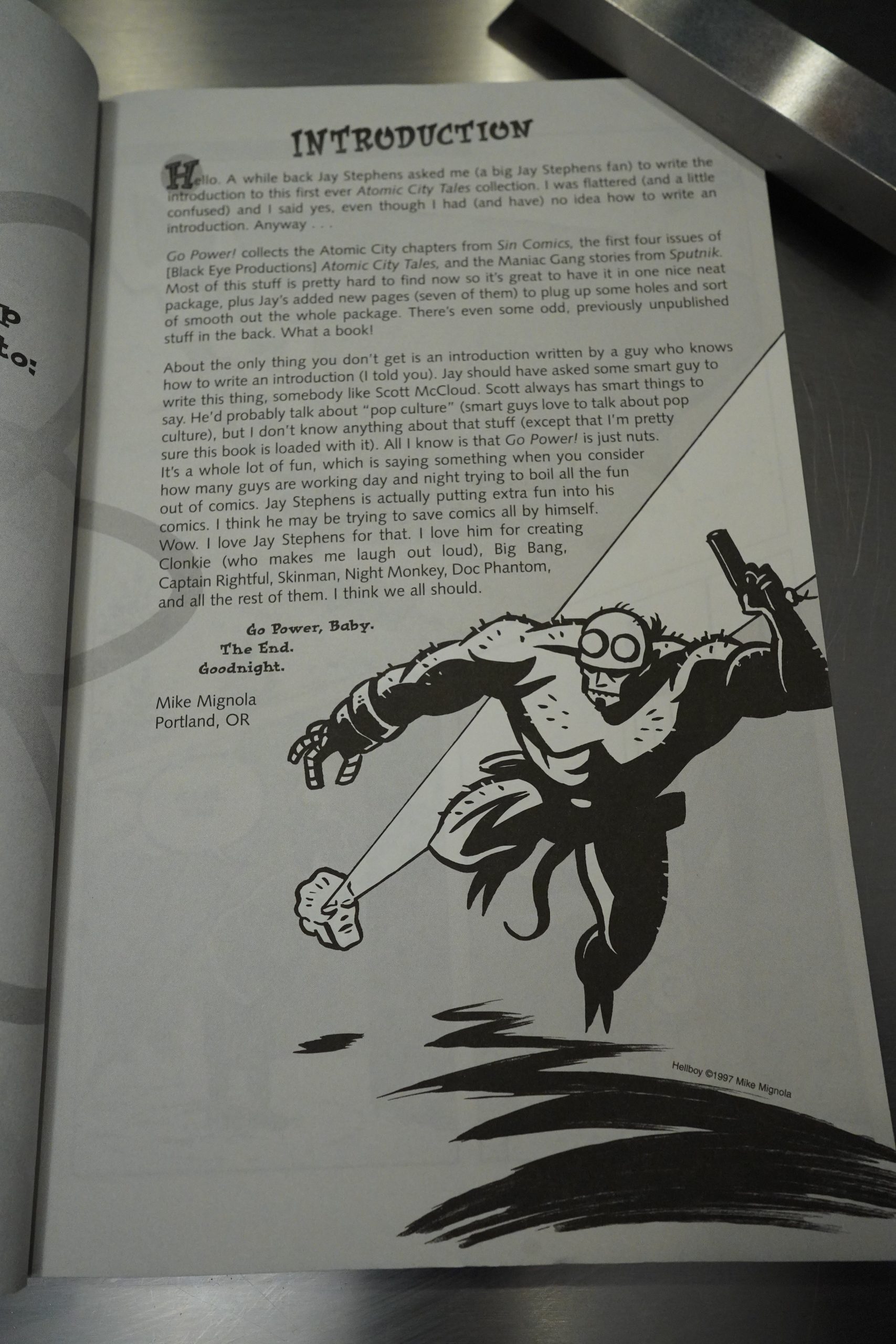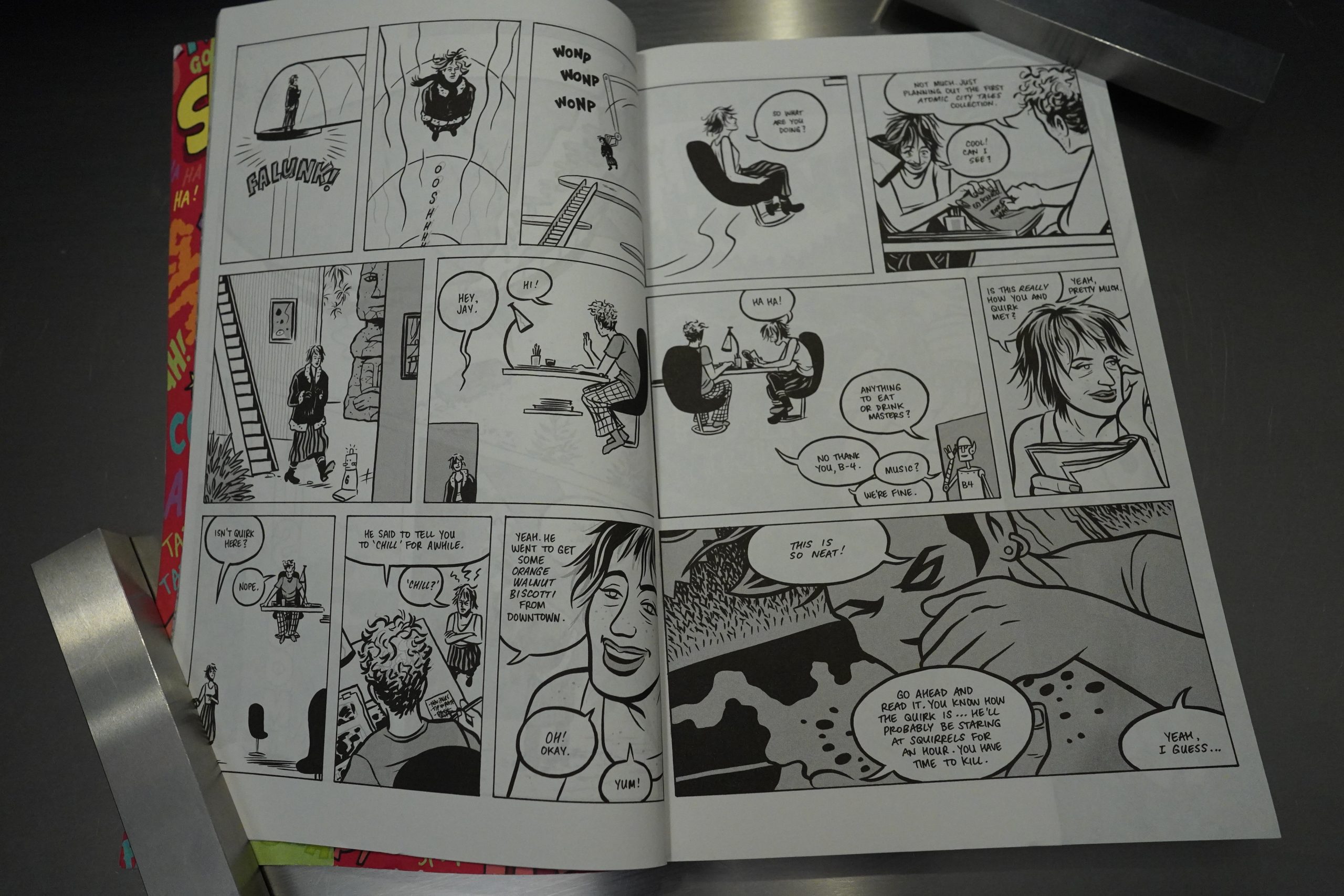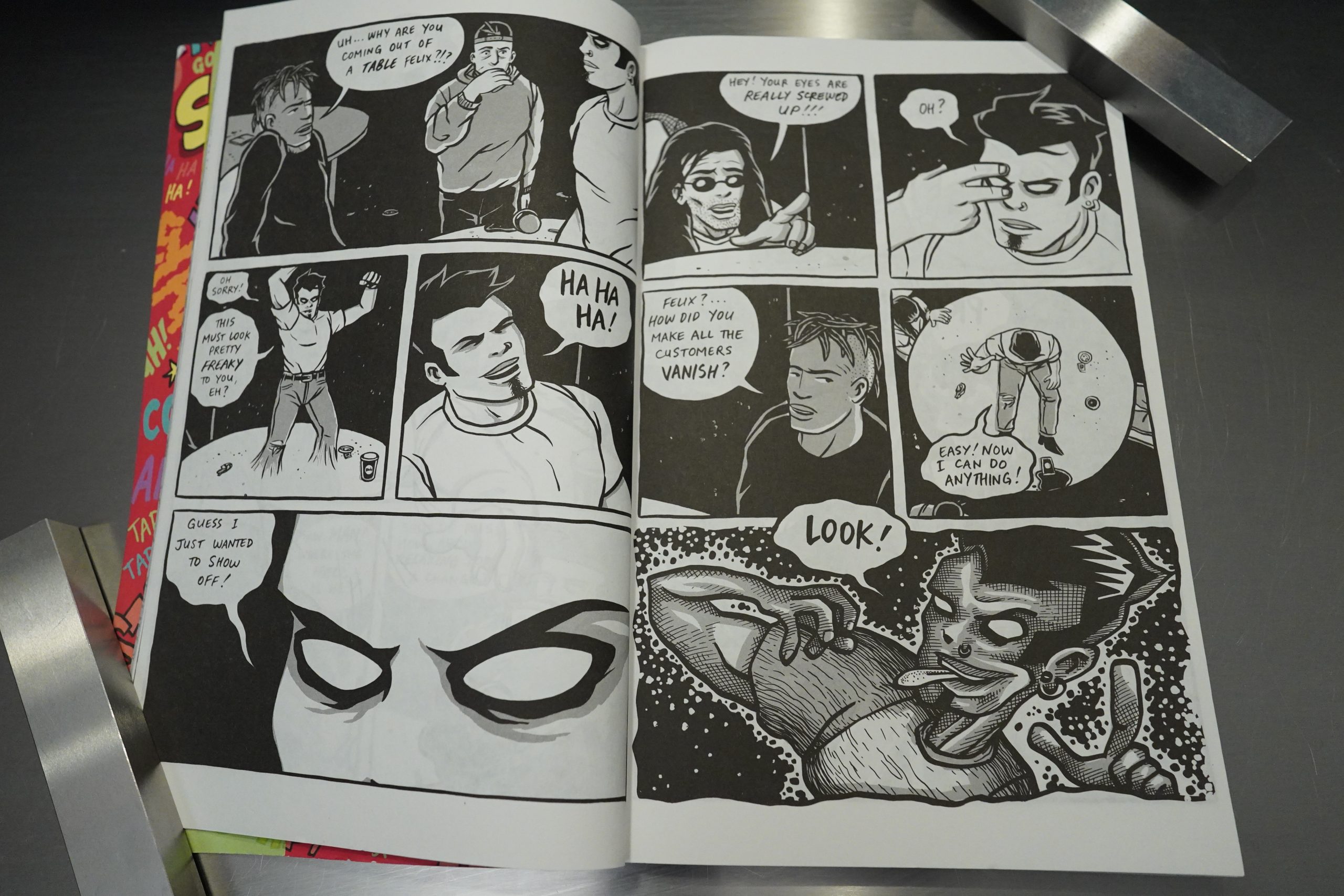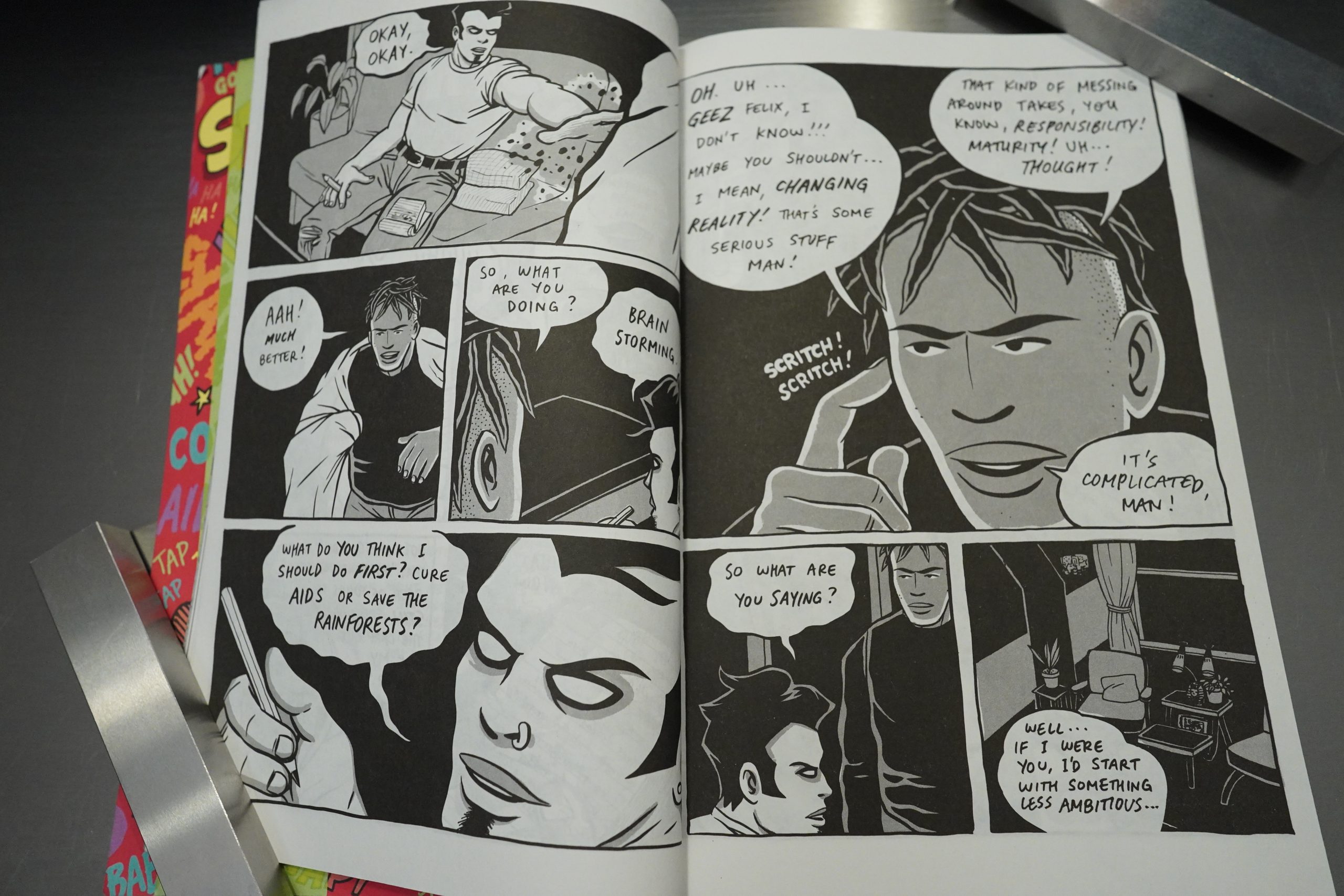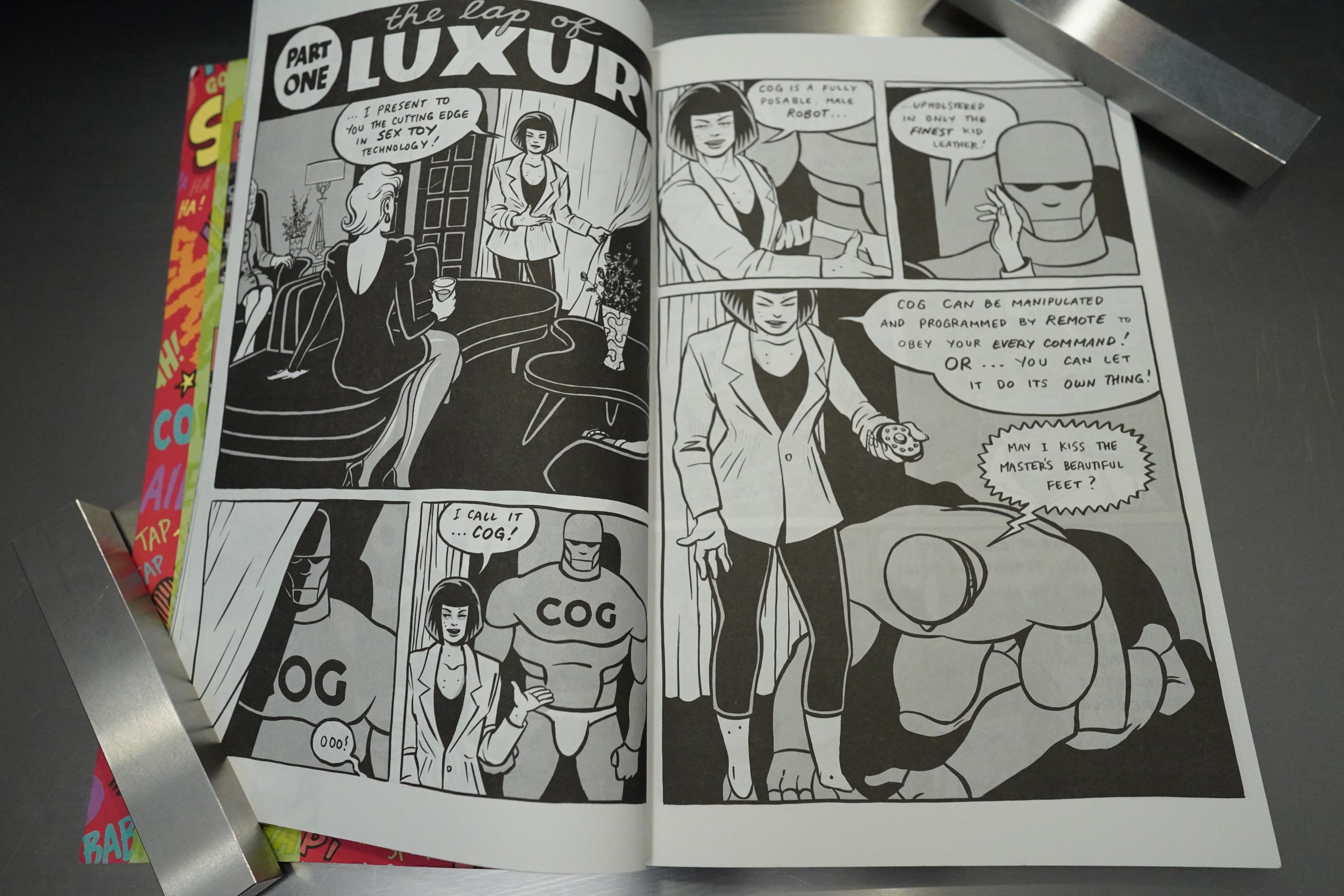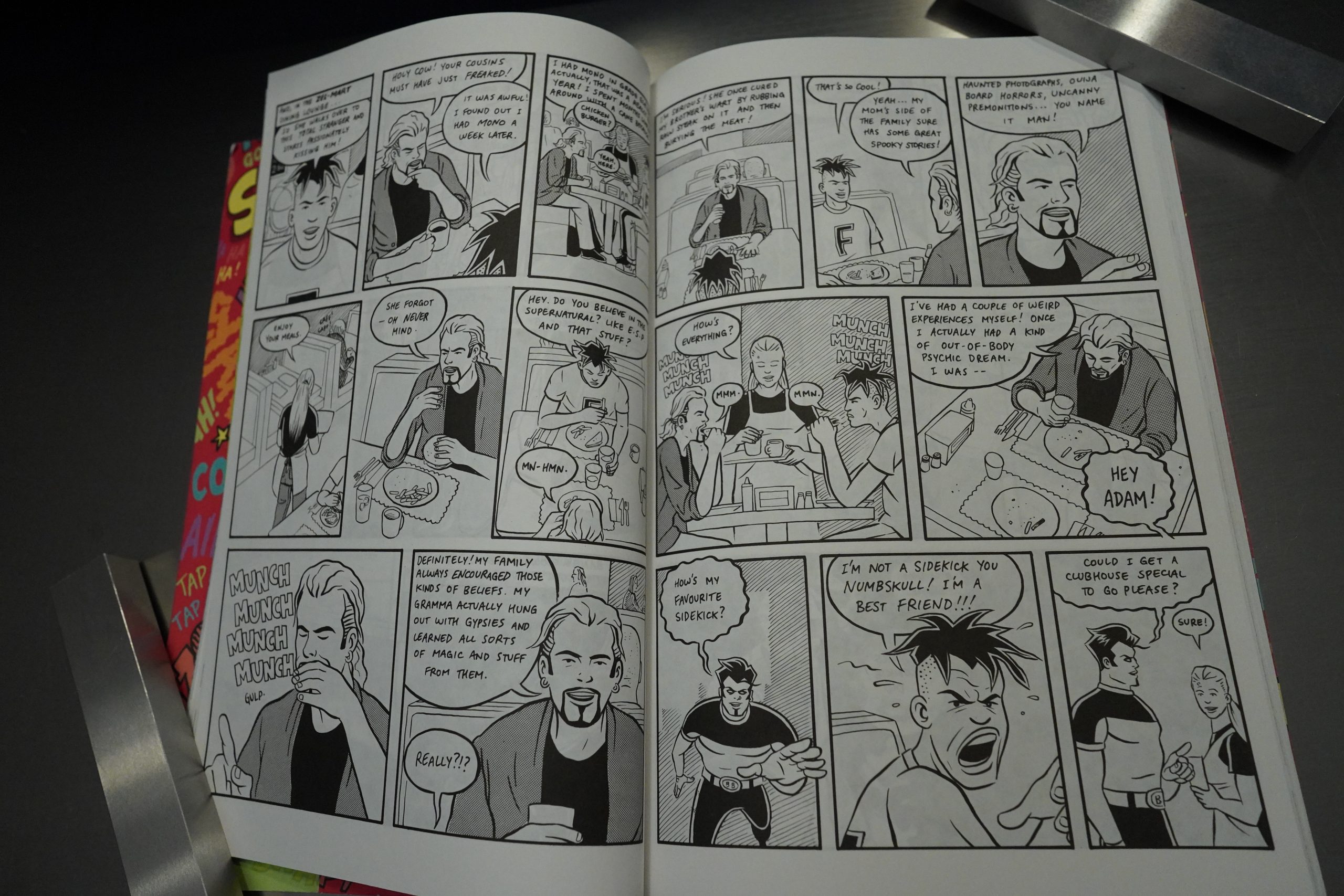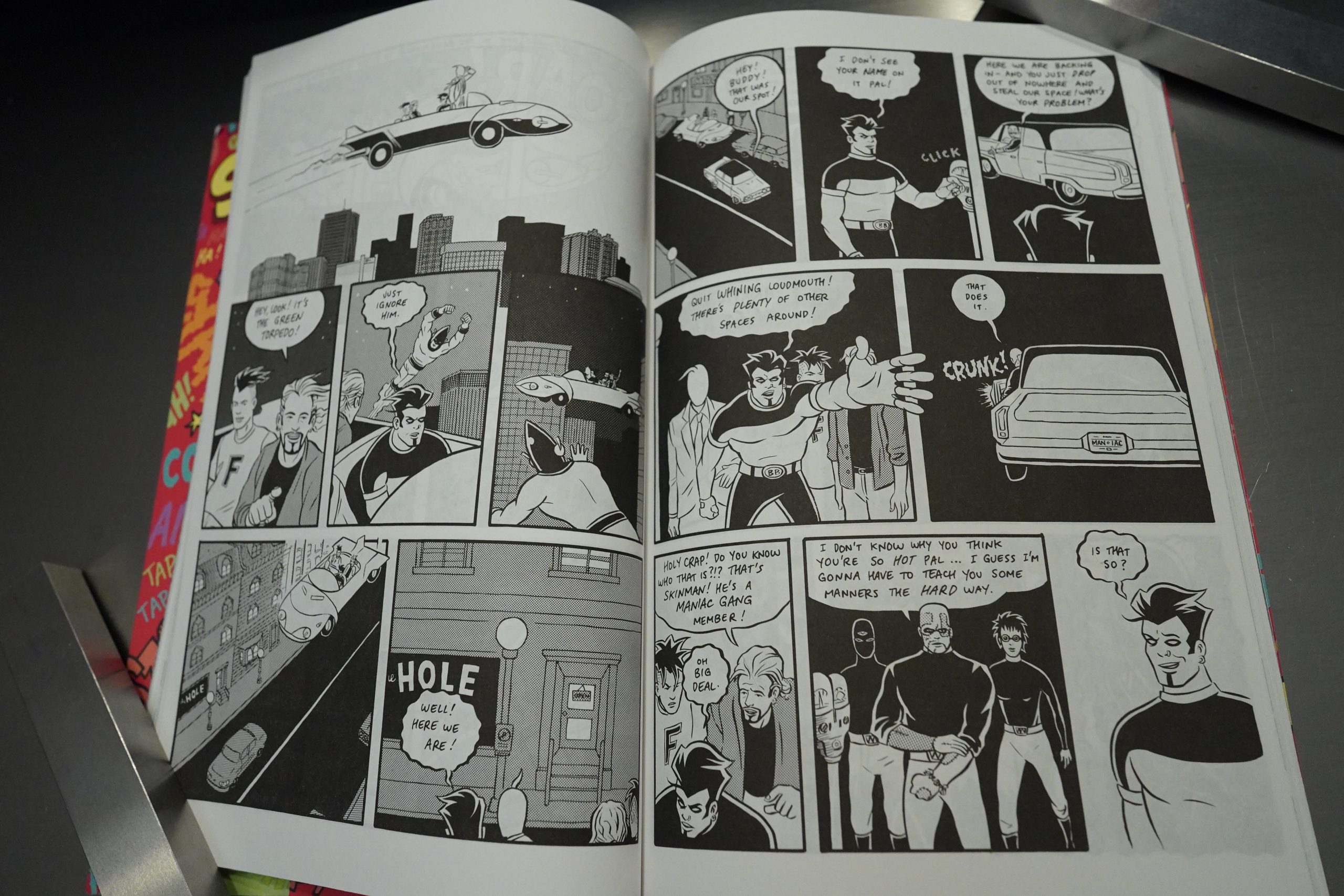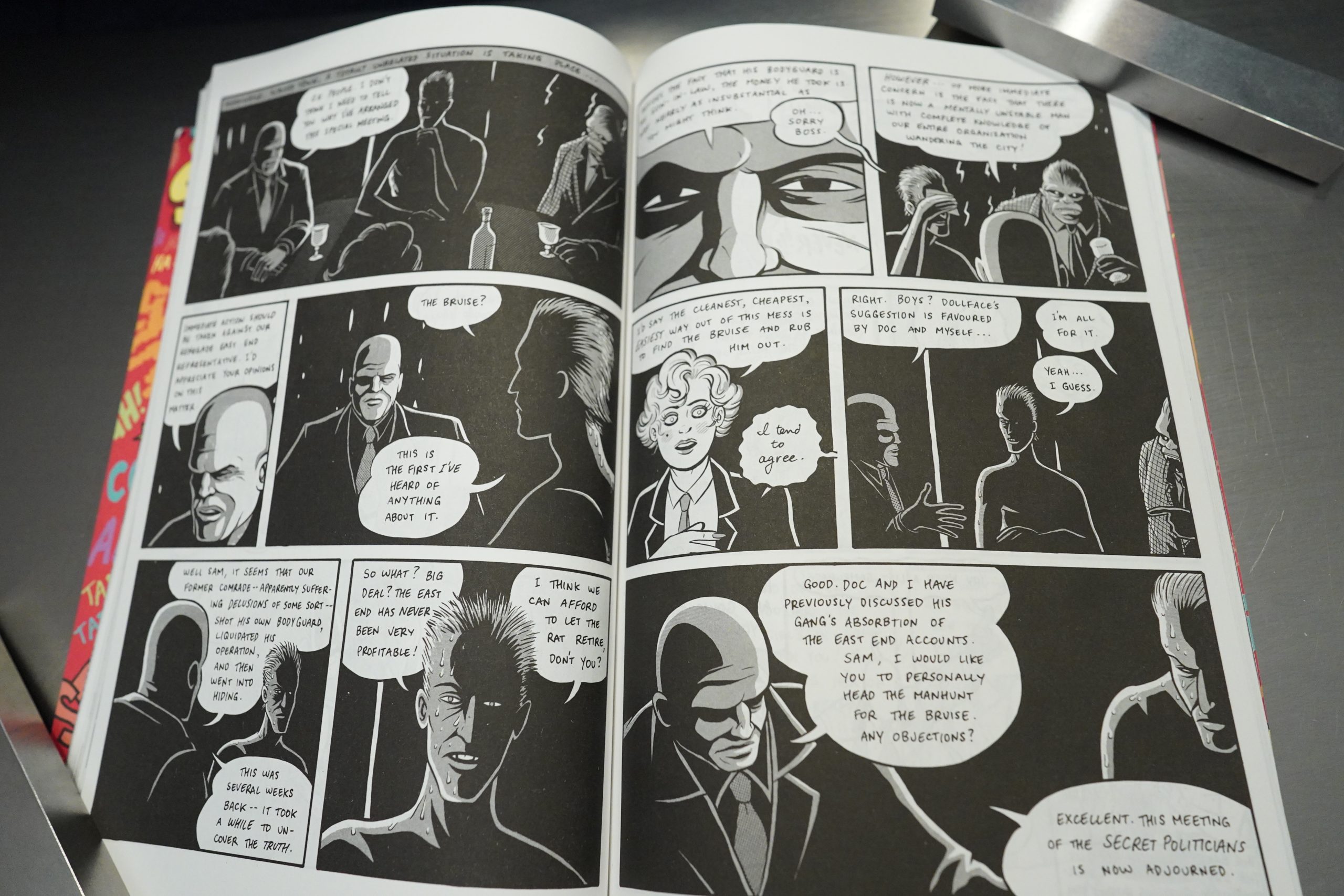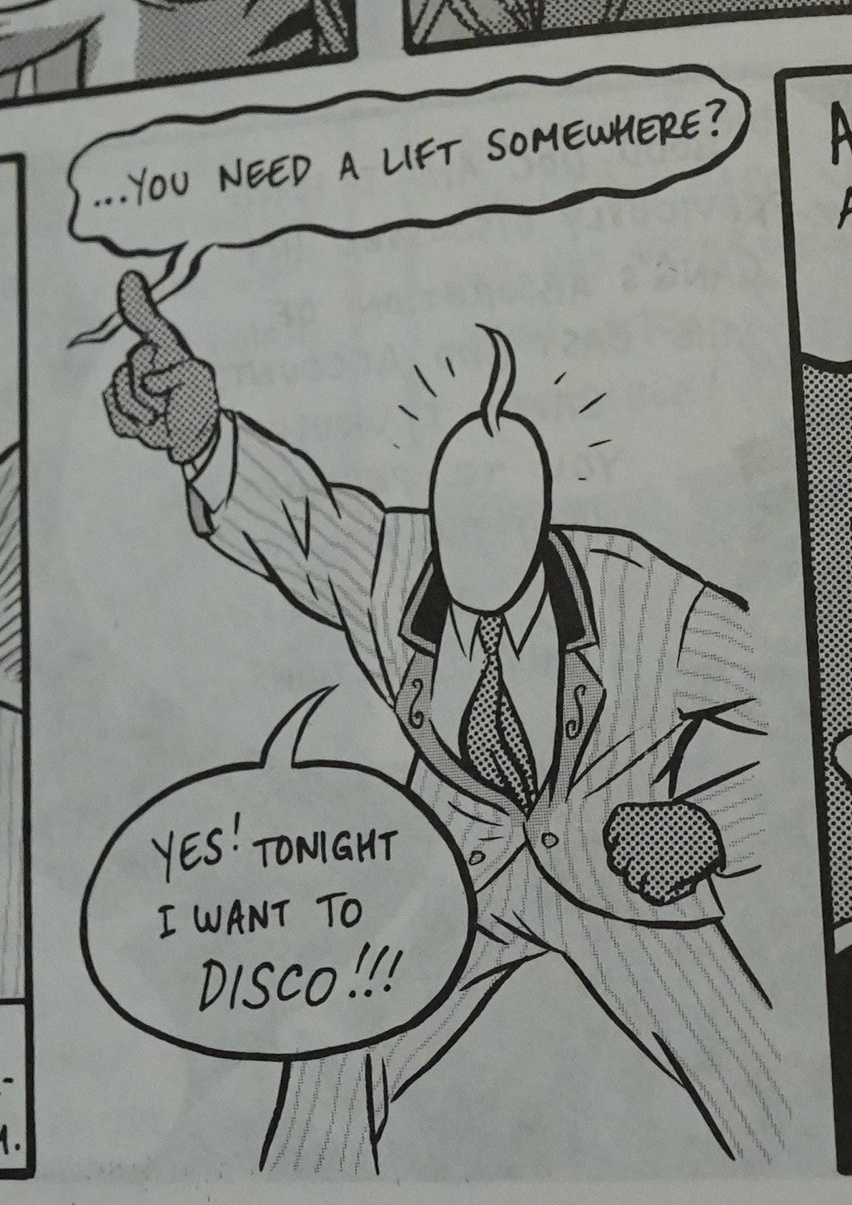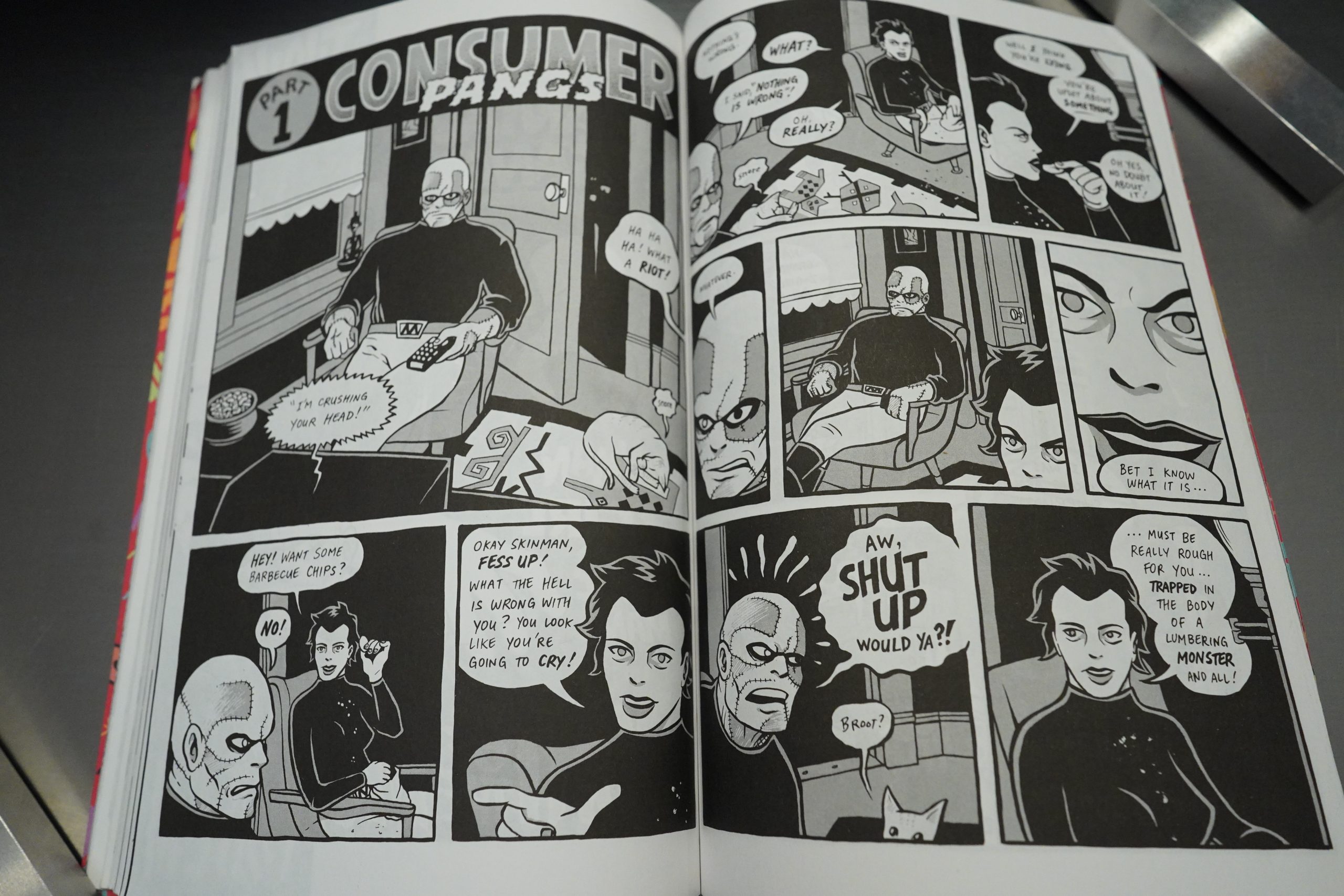Go Power!: The Complete Atomic City Tales Collection (1997) #1 by Jay Stephens
As far as I can tell, this is the last thing that the (post-)Ocean Group iteration of Kitchen Sink published before (almost) going under, and then being bought by a new investor. So I’m going to cover more of that at the end of this blog post, but let’s read the book first.
From the title, I had assumed that this would be a, well, complete collection of all the Atomic City Tales stuff (including the three issues that Kitchen Sink had published), but I missed the “vol 1”, I guess, and Atomic City Tales wasn’t officially dead yet. (Reading interviews with Stephens, he seemed rather burned out on the concept, so I was thinking that he’d decided to cancel it already.)
Bu I think Oni Press printed the entire series in two volumes, judging by the titles of the collections alone.
So: This collection collects all the old stuff (published by Black Eye, mostly), and adds stuff like this framing story.
The earliest stories have more rough-hewn artwork.
These were originally published in Stephens’ one person anthology Sin, I think? And you can see how the concept might have grown organically, from a pretty goofy “what if one of these slackers got the powers to change reality” to being a almost a super-hero comic book.
In interviews, Stephens said he got consistent feedback about the Atomic City stuff (as opposed to the rest of his material): People didn’t like it (as much as they liked his other stuff). It’s plenty amusing…
… but it doesn’t really seem to go anywhere. Which is perhaps not that surprising if it just sort of… grew… and reading the collection, it’s charming, but it’s not really compelling.
The artwork is extremely appealing, though.
But it’s like… he hand-waves at perhaps building to some sort of more complex narrative, but then nothing ever comes of it. I’m assuming he put scenes like this in just to fuck with people (“haha! you think this is going somewhere? I’ll show you!”), and I’m all for that, but in collected form, it’s hard not to grow impatient with it all.
I guess I never made the connection to Flaming Carrot before — this isn’t just inspired by The Jam or Mike Allred, but is perhaps also inspired by Bob Burden?
The storylines in this book all have endings of sorts, but they aren’t all that satisfying. I think reading this in a monthly book would be more satisfying — the lack of it all building towards anything would be less jarring.
After doing these stories for Black Eye, Stephens got feelers from Matt Groening’s Zongo Comics to take Atomic City Tales there. They dicked him around for almost a year, finally giving him a ridiculous contract where Zongo would own most of the rights to the entire concept, and he finally told them to go fuck themselves. (I’m paraphrasing a couple interviews slightly. Sliiightly.) He then took the series to Kitchen Sink, who were great about everything, but had economic problems, so things didn’t really go that well there either.
But before we leave this book and go on to talk about Kitchen Sink’s near-bankruptcy in 1997, Stephens has an interesting take on being published by small publishers like Black Eye.
Stephens is interviewed in The Comics Journal #212, page 95:
[talking about The Land of Nod]
STEPHENS: What happened is.. .Michel for some rea-
son decided that even though the artwork’s all messy
and rough, the lettering might have a bit too many
black flecks on it for reproduction. I was in Prague for
all of this. The issue should have been out and on the
stands before I left, and wasn’t, which was another
continuing problem with Black Eye. I mean, poor
Michel — I don’t know why he thinks it has to be a
one-man operation, but you can’t do everything. Any-
way , so first ofall he decided to Scan the lettering, clean
it up and drop it back in. Whatever. Thadshis preroga-
tive, I suppose, as a publisher. So he personally made
the mistake of dropping the same thing in twice, or
forgetting to drop something in. Thads fine. The
tragedy comes when the bluelines, which he’s paying
good money for, come in, and he doesn’t look at them.
He didn ‘t checkover the printer’s blueline copy, and he
had the book printed — the fill run — with errors,
which is a pretty big mistake. And from what I hear, in
the same couple of months that he did that was the
whole Black Eye disaster, which I don’t need to cover
— I mean, it was covered in an earlier Journal article.
There were missing pages in Bnlbakeds book He
printed poor Brian Biggs’ cover upside down — it was
a disaster. He forgot to ship books to a small press
convention — just a disaster. It was a mess. I’m
embarrassed talking about it.
SULLIVAN: It’s unfortunate, because he uas publishing a
lot Of teOrk. He Obviously cared about it. I’m sure he
either not making money or not making Very much
money.
STEPHENS: He was not making money. But that brings
up an interesting point. You say that as ifthaes a good
thing.
SIILIVAN: NO, no, r m not saying that’s a good thing.
I’m saying poor Michel.
STEPHENS: Yeah. Well, I think that was one of the
problems. I think that Michel though the was martyring
himself to get good comics out there, and what he was
really doing is not adequately promoting the works and
therefore not making the artists any money.
I don’t bear that much ill will. I mean, publishers
are publishers, and I pretty much know what to expect.
Yowza. That’s a harsh take on being a micro publisher.
Darcy Sullivan writes in The Comics Journal #196, page 112:
Any comics fan who doesn’t like
Jay Stephens’ work is a clod. That said, this book isn’t
the nirvana Of The Land of Nod, the greatest kiddie work
for adults on the stands. Go Power instead collects
Stephens’ silly superhero work from his Atomic City Tales
series, with some “Maniac Gang” strips from Black Eye’s
superlative, short-lived Sputnik anthology thrown in.
Even second-tier Stephens can make milk come out
of your nose. When Skinman upbraids a colleague with
“Quit goofing off Z-Girl! We’ve got a lot of evil to do
tonight!” — and when mood maestro Mike Mignola
pens a fannish introduction — you know you’re onto a
good thing. Atomic City Tales probably suffered by
sharing the market with Mike Allred’s Madman, which
also drained attention away from another superior romp,
Don Simpson’s Bizarre Heroes. But Stephens far outdoes
Allred in the laughs department, and if Kitchen Sink
would spring for some color we
might get a real horse race
going here.
On the other hand,
better we keep Stephens
focused on The Land of
Nod, his true claim to
comic genius. So buy this
book — c’mon, ya gotta
— but if you see Jay, tell
him you only kinda sorta loved
it. Liked it. I mean.
The Comics Journal #212, page 94:
SLLLIVAN: Now, you had a collection of this, called Go
Power. That really sneaked out.
STEPHENS: It didn’t sneak out, it’s the last thing that
came out before Kitchen Sink went temporarily bank-
rupt. Again, my timing could not have been worse.
The collection had been printed, and Kitchen Sink
didn’t really exist any more. There was no system to get
itoutthere. I think the initial orders wentthrough, and
then that was it. les been remaindered at Diamond,
so. another disaster.
SULLIVAN: Did you end up with Kitchen Sink owingyou
money ?
STERENS: Oh no, they were great! I loved working
with Kitchen Sink. Denis is great. I wish I’d done
better by them. I wish I could have put it out faster, and
I wish I’d had that clear vision I was just talking about.
[laughs] It was just bad timing. They were in the
middle Of that mess with the second Crow film. They
were kind enough to apprise meofthe coming troubles,
but I truly did think they were out of business for
awhile, which was when I moved to Europe, and I
didn’t know they were back till much later. But when
I did find out they were in business and I gave them a
call, they promptly paid me. I had no problem. Of
course, when the Journal did the report on that, they
didn’t bother to call me. [laughs] They never call me
for news, because I only have good news. What news
would that be?
OK, back to Kitchen Sink’s woes.
The Comics Journal #196, page 9:
After weeks of speculation that the
struggling Kitchen Sink press was on
the verge of shutting down, the
company’s taunder and president
Denis Kitchen — desperate to find a
“white knight” to help hint buy back
his company froin shareholders who
had withdrawn financial support
earlier this year— was able to secure
a statement ofinterest from a possible
new Investor on Thursday, June 4,
one day before a deadline to repay a
loan owed to the company’s bank.
(According to Kitchen, if the bank
calls in the loan, a probable scenario
would be the liquidation of company
assets to pay the loan.) The move
gives Kitchen and his brother Jim
(V.P. m charge of production) an
additional month to engage in further
discussions with a small group Of
interested parties — that at one at
time included Diamond Distribution
before a deal between the two
companies apparently fell through,
Kitchen acknowledged, partly due to
opposition from one or more of
Diamond’s exclusive suppliers. But
while it appears that Kitchen still has
chance to save the company, 18 of
KSP’s 30 enlployees reportedly have
been laid off, KSP projects scheduled
to ship through September are in
limbo, and the company has recently
relocated its offices after having
problems paying rent at its previous
location in Northampton, Mass.
The Comics Journal #197, page 7:
NEW LEASE ON LIFE
FOR KITCHEN SINK?After narrowly averting a shutdown
in June, Kitchen Sink Press founder
and president Denis Kitchen has re-
portedly secured a letter of intent
from a prospective investor to help
him buy back his company from a
current group of majority sharehold-
ers who informed Kitchen earlier this
year that they were withdrawingtheir
financial support from the company.
While the interested party is currently
examining KSP’s assets — a process
that could several weeks — KSP’s
senior director ofsales and marketing,
Jamie Riehle, confirmed to the Jour-
nal that KSP has “what we hope are
the investors that we need in place”;
and although “there’s still an enor-
mous amount of paperwork and le-
galities that have to be gone through,
the company is resuming at least part
ofits publishing schedule in the hopes
of getting some books out in time for
Comic-Con International, held July
17-20 in San Diego (Kitchen was
absent from the KSP offices and un-
available for comment following his
wife’s recent childbirth).
But even if the company has in-
deed found its “white knight,” the
period of uncertainty took its toll.
More than halfofthe staffwas laid off
in May, and at least two of KSP’s
projects — the alternative anthology
Blab! and Larry Welz’s racy adult
comic Cherry — have broken ties
with their former company in the
midst Ofthe upheaval.
The Comics Journal #202, page 19:
The financial maneuvering that al-
lowed Kitchen Sink Press to
re-emerge from near-bankrupcty last
year also left in its wake a whopping
debt of approximately $2.25 million,
much of it completely unrecoverable
by the creditors. Kitchen Sink press
found its financial savior last fall in the
form of TV producer Fred Seibert,
whose invesunent— along with capi-
tal from Denis kitchen, Jim Kitchen,
and DreamWorks’ Robin Sloane —
in Disappearing, Inc. led the group to
buy back KSP’s assets from a bank
that had foreclosed on KSP’s million
dollar loan. But while Seibert’s move
saved KSP as a publisher — allowing
the new company to begin rebuild-
ing, move to new offces and rehire
employees that had been laid of —
the old company, KSP Inc., was most
likely dissolved, Kitchen said, and as
such, is no longer responsible for the
debts it incurred during the period Of
financial turmoil.
According to Kitchen, the bank
received all of its money back — the
biggest losers from the default were
the old investors — such as New
York lawyers Leonard Lichter and
James Spitzer. along with Pierre
as guarantors when the bank agreed
to gave Kitchen the loan in 1996.
And many Ofthe unsecured creditors
— such as printers, manufacturers,
and others who did freelance work
for KSP — who were owed money
when KSP defaulted have no hopes Of
ever gettingit back, although Kitchen
said that he had “voluntarily” paid
“the vast majority” ofKSP’s creators.
The financial turmoil at KSP last
year stemmed in part from two major
losses: the July 1996 demise ofCapital
City Distribution, which had signed
KSP as an exclusive supplier, and the
box-offce failure of The Crow: City of
Angels, the success of which KSP had
gambled on by producing far more
merchandise than they were able to
sell. By January 1997, the investors
who were keeping KSP afloat — the
same group that included Lichter,
Spitzer and Schoenheimer — told
Kitchen that they were withdrawing
their financial support, an announce-
ment which set Kitchen offin search
Of a new backer(s). The parties who
discussed investing in KSP included
Diamond Distribution owner Steve
Geppi — but that deal fell through
amidst rumors that Dark Horse, One
of Diamond’s exclusive publishers,
owed; not counting the previous in-
vestors, the largest portion of the
debt, he estimated, was owed to
Ronalds, a printer that såll does business
with KSP. artisß and writers who
were owed money, Kitchen added, were
paid voluntarily Out of the new Influx Of
money from the new invstors[…]
Because the new corporation
purchased only the assets ofKSP and
none Of the liabilities, Kitchen said,
much of the debt incurred by the
now-defunct KSP Inc. is unrecover-
able by the creditors to whom it is
problems at KSP, his initial response
sympathetic: “l aware that it
was happening.. I felt bad for Denis
personally — duis could be happening
to me personally as a businesman —
and hoped for the best.
But when he approached
Kitchen at last year’s Comic-Con
International inJuly, while the refi-
nancing was still taking place,
Kitchen explained to him that he
was unlikely to ever get paid for his
work. Sawyer followed up on the
matter on Sept. 15 through his law-
yer, who requested information
which would confirm that KSP had
insuflcientassets to pay the $17 ,253
the company owed Sawyer — and
after receiving several documents
relating to the sale, Sawyer’s lawyer
informed him that KSP was not ob-
ligated to pay him.
“I’m upset but I don’tknow that
I have any further recourse,” said
Sawyer. “According to U.S. business
law they don’t owe me any money. I
would suspect in a very cynical way
that the sale is above board and is
perfectly legal”
• ‘The only thing that’s tarnished in
this is the reputation of Denis Kitchen
as the savior ofthe little guy,” Sawyer
added, well as the notion ofKSP “as
an artist-friendly company where art-
ists have an Oasis from the corporate
practices of the major companies.”
Kitchen responded to Sawyer’s
complaints by stating all of the credi-
tors in position had been
informed Of the transaction and
seemed to understand what had hap-
pened.
Hm! I can’t find any news from the time period then the Fred Seibert takeover was taking place, but here’s a later retelling:
The Comics Journal #213, page 24:
“He gave me a long
convoluted story of how
he had stood up to the FBI and
wouldn’t be a stool pigeon against a
friend,” Kitchen said. “He put it in
terms of being a hippie outlaw. The
FBI Was out to get him. The truth is
he got caught doing something ille-
gal. I remember being a little
nonplussed, but one thing he is is
charming. He’s a charming scoun-
drel. and his tactic worked on me.”
Having convinced Kitchen,
Todrin rolled up his sleeves and set to
work casting a spell on the Ocean
investors. By the time they left the
meeting, thanks largely to Todrin’s
presentation, Kitchen had everything
he had wanted from the Ocean Group
and a free rein to strike a new invest-
ment deal with Fred Seibert.At this stage of the game, KSP
had been foreclosed upon after de-
faulting on a $1 million bank loan.
That loan was personally guaranteed
by certain Of the Ocean investors,
including Kitchen, and those guaran-
tors were forced to come up with the
money to repay the loan. Kitchen’s
share ofthat repayment was $25,000.
Having covered the loan, the guaran-
tors were in possession of KSP assets
and looking for a buyer to take them
over. The Kitchens formed Disap-
pearing Inc. to negotiate the
acquisition of KSP on behalfof new
investors. After Geppi fell out, Seibert
became the principal investor of a
group which also included, in addi-
tion to Jim and Denis Kitchen,
money paid to the guarantors. Seibert
and his small group Of investors put
up the entire amount (in a down
payment, monthly installments and a
final lump-sum payment) in exchange
for 70% interest. The Kitchens to-
gether retained 30% equity in
recognition of their expertise and
experience with the company. Seibert
obtained the assets ofKSE, but not its
liabilities, so unsecured creditors were
out ofluck, and more than $2 million
in debts were left unpaid. Kitchen
claimed that, at his insistence, KSE
creators were paid what they were
owed, usingDisappearing Inc. money.
Todrin’s powers of persuasion
were less successful with the FBL The
investigation was resolved when he
pled guilty to bank fraud. Todrin was
disbarred and sentenced to house ar-
rest, required to wear a monitoring
device on his ankle and allowed to
leave his home only during working
hours.
“We’d be in a meeting,” said
Kitchen, “and it’d get to be 5 or 6
p.m. or whenever his curfew and,
all of a sudden he’d say, ‘I’ve gotta
run,’ and we’d say, ‘Can’t it wait—
the meeting’s almost over,’ and he’d
say, ‘No, I’ve really gotta run. ‘ When-
ever a bunch ofus got together to play
poker, it always had to be at his house,
because he couldn’t leave.
Once the full story of his bank-
fraud sentencing came out, Kitchen
and Grover said, Todrin showed no
shame or remorse around the Kitchen
Sink offices. “The ankle bracelet was
always visible, because he always wore
shorts, even though he’s probably not
the sort of person who should wear
shorts,” said Kitchen. ‘ ‘He wore the
bracelet like a badge of honor.”
Grover told the Journal, “He
would put his feet on the table be—
cause he wanted you to know they
were there.”
Ankle bracelet aside, Todrin’s
hard-sell manner quickly began rub-
bing Kitchen Sink staff the wrong
way. According to Grover, “He’d say
stufflike, ‘Here’s the problem. Here’s
the solution. We’re gonnna sell stuff,
because we’re a sales-driven com-
pany.’ The next week he’d come in
and say it was up to the marketing
department. because the sales staff
was worthless.”
Whoever else he was alienating,
however, Todrin was winning over
the biggest customer ofall. “As I was
gradually starting to see Don Todrin
for what he was, the opposite was
happening with Fred Seibert,”
Kitchen told theJ0umal. “He tho*t
Don was the most fabulous person in
the world.’ •
But now we’re into the next part of this epic saga, when Todrin fucked Denis Kitchen over, which we’ll cover at the end of this blog series (which will be the “Mona” post).
This is the two hundred and sixth post in the Entire Kitchen Sink blog series.
